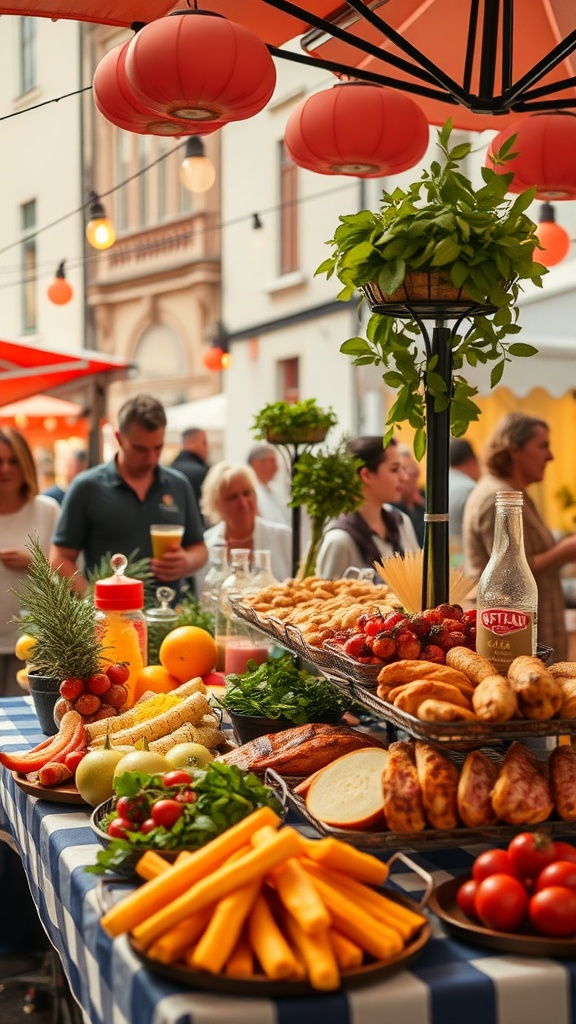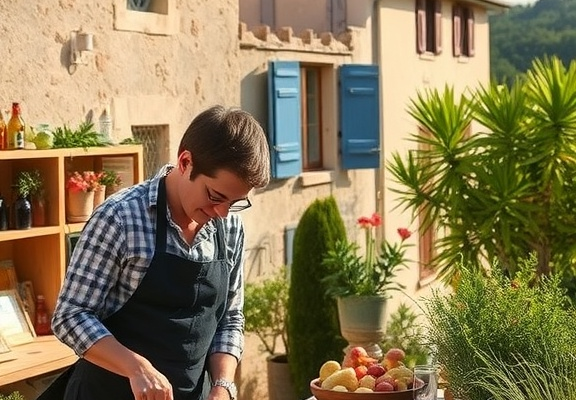Unforgettable Food Festivals Worth Traveling for in Europe
Europe is a treasure trove of culinary delights, and its food festivals are a reflection of the diverse flavors, vibrant cultures, and passionate chefs found across the continent. Whether you’re a passionate foodie or just looking for a fun way to immerse yourself in local traditions, these unforgettable food festivals are worth traveling for. Each festival offers a unique experience that showcases regional specialties, cooking techniques, and a chance to mingle with locals and fellow travelers. Below are notable festivals that should be on your travel radar.
Thank you for reading this post, don't forget to subscribe!La Tomatina – Buñol, Spain
Held annually on the last Wednesday of August, La Tomatina is one of the most famous food festivals in the world. This wild tomato-throwing event draws thousands of participants eager to join the tomato fight. After the massive food fight, participants can enjoy traditional Spanish dishes like paella and tapas at nearby stalls. The atmosphere is festive, and everyone leaves with a smile (and plenty of tomato pulp)!
Bordeaux Wine Festival – Bordeaux, France
The Bordeaux Wine Festival, usually held in late June, is a paradise for wine lovers. This four-day celebration showcases the wine of the Bordeaux region, one of the world’s finest wine-producing areas. You can participate in tastings, attend gourmet dinners hosted by top chefs, and enjoy boat tours on the Garonne River. The festival is an excellent way to explore the rich food and wine culture of France.
Oktoberfest – Munich, Germany
Oktoberfest, running from late September to the first weekend in October, is more than just beer. This world-renowned festival celebrates Bavarian culture with traditional foods like pretzels, sausages, and schnitzel. You can experience lively music, dance performances, and the spirited atmosphere of the beer tents. Come hungry and ready to embrace the lively spirit of Germany!
Truffle Festival – Alba, Italy
Every autumn, the town of Alba in Italy transforms into a truffle lover’s dream during the White Truffle Festival. Running from mid-October to mid-November, this festival highlights the prized white truffles of the region. Visitors can attend tastings, cooking demonstrations, and live auctions. Don’t miss the opportunity to indulge in exquisite truffle dishes served by local restaurants, making for an unforgettable culinary experience.
Cheese Rolling – Gloucestershire, England
For an unusual twist, you can visit the Cooper’s Hill Cheese-Rolling and Wake, held on the last Monday of May. This strange yet entertaining event involves rolling a large wheel of cheese down a hill, with participants racing after it. While the festival is about the race, you can enjoy an array of local cheeses and artisan foods while soaking in the atmosphere. Get ready for some serious fun!
Food Lover’s Festival – Melbourne, Australia
Though not in Europe, this festival attracts many European chefs and food enthusiasts due to its international flair. Held in March, the Food Lover’s Festival features tastings, cooking demonstrations, and educational sessions. The festival celebrates the best local produce, allowing you to taste food from top restaurants curated by renowned chefs. Expect a gourmet feast with a cosmopolitan touch!
Here are a few other noteworthy mentions:
- Strawberry Festival – Plant City, Florida, USA (March)
- Salon du Chocolat – Paris, France (October)
- Montreal Jazz Festival – Montreal, Canada (June/July)
- Naples Pizza Festival – Naples, Italy (September)
Feast of St. Nicholas – Amsterdam, Netherlands
This late-autumn festival, typically celebrated in early December, honors its namesake with traditional Dutch treats including speculaas cookies and chocolate letters. As the streets fill with festive cheer, you’ll find markets brimming with local delicacies and holiday goodies. Enjoy the festive lights and communal spirit while tasting these delicious treats.
Fête de la Gastronomie – France
This France-wide celebration takes place in late September and honors the country’s culinary heritage. Throughout the festival, towns across France organize events such as workshops, tastings, and gourmet meals. This is a perfect opportunity to dive deep into French cuisine and experience the passion of local chefs.
If you’re a traveler who loves food, Europe’s diverse food festivals offer thrilling experiences and mouthwatering delicacies. From lively tomato fights to refined wine tastings, there’s a festival for every palate. So grab your passport, and embark on a culinary journey through Europe’s unforgettable food celebrations!
The Cultural Significance of Culinary Celebrations Across European Countries
Across Europe, culinary celebrations are pivotal in showcasing the rich cultural tapestries of different nations. These events not only bring communities together but also highlight the unique flavors, traditions, and history that define each region. From vibrant street fairs to sophisticated tasting events, these festivals serve as a grand stage for local chefs, artisans, and food lovers to connect. Here’s a closer look at the significance of culinary festivals throughout the continent, focusing on their role in celebrating heritage and fostering community.
Culinary festivals often celebrate local produce, reflecting the unique agricultural traditions of each area. For example:
- La Tomatina in Spain: This famous tomato fight isn’t just about fun; it commemorates the local harvest of tomatoes, a significant crop in the region.
- Oktoberfest in Germany: Originating as a royal wedding celebration, this beer festival emphasizes local brewing practices and traditional Bavarian cuisine.
- Cheese Festival in Italy: Regions like Tuscany offer cheese festivals that promote artisanal cheeses and local dairying techniques.
These festivals also act as important cultural touchpoints, telling stories of the communities that host them. During events like the Scallop Festival in Scotland or the Almond Blossom Festival in Spain, you can experience the history of the area through food. Food becomes a narrative device, conveying the local lore, culinary techniques, and the bonds that tie generations together.
Moreover, culinary festivals serve as a catalyst for tourism, drawing food enthusiasts from around the world. Cities like Lyon, known for its gastronomic heritage, host festivals that attract thousands. These events highlight the culinary arts, providing attendees with not only the taste of local dishes but also enriching experiences through cooking classes and demonstrations by renowned chefs. Visitors gain a profound appreciation for regional cuisines while supporting local economies. Additionally, these interactions often spark a desire to learn more about the culture behind the food, creating lasting interest and engagement.
Another significant aspect of these celebrations is their role in culinary education. Many festivals offer workshops and classes, inviting participants to learn the intricacies of regional cooking methods. Imagine taking part in a pasta-making class in Bologna, Italy, or learning the art of French pastry in Paris. These hands-on experiences foster a deeper connection with the food and culture. They also help preserve culinary traditions that might otherwise be forgotten, ensuring that the younger generation appreciates their heritage.
Furthermore, culinary festivals highlight sustainability and local sourcing. The emphasis on farm-to-table practices has gained traction in recent years, encouraging chefs and attendees alike to prioritize local ingredients. With events like the Cycle to Eat Festival in Denmark, a focus on organic produce and responsible eating is central. This shift reflects a broader societal trend towards environmental responsibility and healthy eating, and food festivals have become influential platforms for these discussions.
- Health Awareness: Events increasingly include discussions and workshops on nutrition and healthy eating.
- Eco-Friendly Practices: Many festivals are adopting sustainable practices, minimizing waste, and promoting local products.
- Inclusivity: Culinary celebrations are becoming more inclusive, showcasing various cultural dishes, ensuring diverse representation.
These events also create opportunities for cultural exchange. Attending a food festival means enjoying flavors from different backgrounds, often in one location. For instance, the Taste of London brings together a medley of international street foods, allowing attendees to sample everything from tapas to Thai curries. Such experiences broaden perspectives and appreciate the culinary wealth available in Europe.
The emotional significance of food cannot be overlooked. Culinary celebrations often evoke nostalgia, bringing back memories tied to family and communal gatherings. Engaging in these festivals allows individuals to connect with their roots, celebrating traditions while forging new memories with loved ones. This emotional connection to food deepens the celebration, making each festival not just an event, but a cherished experience.
Ultimately, the cultural significance of culinary celebrations across Europe is manifold. They unite communities, educate individuals, promote sustainability, and preserve the rich tapestry of traditions. So next time you plan a trip to Europe, consider exploring the region’s culinary festivals. Each bite you take and every flavor you savor will tell you a story, inviting you to be part of a culture that is both vibrant and enduring.
Conclusion
Traveling to Europe offers an extraordinary opportunity to immerse yourself in vibrant cultures, especially through the lens of food. The unforgettable food festivals scattered across the continent not only please your palate but also connect you to local traditions and communities. Each festival tells a unique story, whether it’s the thrilling atmosphere of La Tomatina in Spain or the charming flavors of the Siena Palio in Italy. These events showcase the rich culinary heritage of each region, making them essential stops for any food lover.
Attending these festivals goes beyond mere gastronomy; it is about experiencing the heart and soul of the destinations. Festivals often become a central gathering point, where locals share recipes, traditions, and the stories behind their dishes. You’ll find yourself not only tasting exquisite foods but also understanding the cultural significance that these dishes carry within their communities. From the street food stalls to gourmet offerings, each bite serves as a connection to history and tradition.
Your adventures in Europe’s food festivals will leave you with lasting memories and a deeper appreciation for the diverse culinary cultures present across the continent. The journey becomes an exploration of flavors, enhancing your travel experience. So, pack your bags and prepare your taste buds for a culinary journey through Europe that is sure to be unforgettable. Whether you’re sampling sweets in Belgium or indulging in hearty fare in Germany, each festival is a celebration waiting for you to enjoy. Make it a point to include these gastronomic events in your travel plans—they are truly worth the journey.






